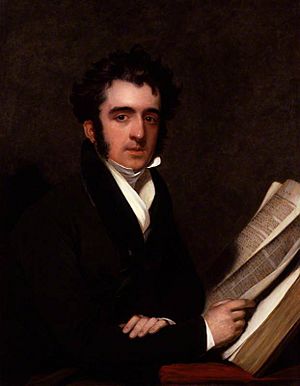George Grote facts for kids
Quick facts for kids
George Grote
|
|
|---|---|

Portrait by Thomas Stewardson, 1824
|
|
| Born | 14 November 1794 Clay Hill, Kent |
| Died | 18 June 1871 (aged 76) Mayfair, London |
| Nationality | English |
| Signature | |
George Grote (born November 17, 1794 – died June 18, 1871) was an English writer and historian. He was known for his strong political ideas and his deep interest in ancient history. His most famous work is a very long book called History of Greece.
Contents
Early Life and Education
George Grote was born at Clay Hill, a place near Beckenham in Kent, England. His family was involved in banking. His grandfather, Andreas Grote, helped start a bank in London in 1766.
George was the oldest of eleven children. His mother taught him at home first. Then, he went to Sevenoaks grammar school from 1800 to 1804. After that, he attended Charterhouse School until 1810. He was a good student and did well in school.
However, his father did not want him to go to university. Instead, he made George work at the family bank. Even though he was busy with banking, George spent all his free time studying. He loved ancient Greek and Roman history, philosophy (the study of big ideas), and economics (how money and goods work). He also learned German, French, and Italian.
George Grote married Harriet Lewin in 1820. She was a writer and later wrote about the artist Ary Scheffer. They had a happy marriage.
Becoming a Writer and Politician
George Grote became very interested in politics and philosophy. In 1817, he was influenced by thinkers like James Mill and Jeremy Bentham. These thinkers believed in Utilitarianism, which is the idea that actions should aim to bring the greatest happiness to the greatest number of people.
In 1821, Grote wrote his first published work. It was about Parliamentary Reform. This meant changing how the government worked to give more people a say. He argued for things like popular representation (more people having a voice) and the secret ballot (voting in private).
Around 1822, Grote started working on his huge book, History of Greece. He also helped create University College London. This was a new university that aimed to be open to everyone, regardless of their religion. He was part of the group that planned the courses and how the university would run.
Political Career
In 1832, George Grote was elected as a Member of Parliament (MP) for the City of London. An MP is a person elected to represent their area in the country's parliament. As an MP, Grote spent a lot of time trying to make the secret ballot law. He believed that people should be able to vote without others knowing their choice. This would prevent pressure or bribery.
He served in Parliament for nine years. However, his political group, called the "Philosophical Radicals," became smaller. He resigned from Parliament in 1841.
Focus on History and Philosophy
After leaving politics, George Grote left his banking job too. He decided to focus entirely on writing. In 1846, the first two volumes of his History of Greece were published. The rest of the twelve volumes came out over the next ten years, finishing in 1856. This book became very famous and important.
After finishing his Greek history, Grote started working on books about famous Greek philosophers. He wrote Plato and the Other Companions of Sokrates, which came out in 1865. This book made him known as a leading expert on Plato in the 1800s. He also started a book about Aristotle, another famous Greek philosopher, but he did not finish it before he died.
George Grote passed away on June 18, 1871, in London. He was buried in Westminster Abbey, a very important church where many famous British people are laid to rest. People remember him as a strong and polite person who cared deeply about his country.
Main Books and Writings
Here are some of George Grote's most important works:
- 1821 – Statement of the Question of Parliamentary Reform
- 1831 – Essentials of Parliamentary Reform
- 1846–1856 – A History of Greece; from the Earliest Period to the Close of the Generation Contemporary with Alexander the Great (12 volumes)
- 1865 – Plato, and the Other Companions of Sokrates (3 volumes)
- 1872 – Aristotle (published after his death)
Recognition and Legacy
George Grote is still remembered today.
- The Grote prize is given each year for excellent research in Greek History. It is named after him.
- Grote Street in the city of Adelaide, South Australia, is also named in his honor.
Images for kids
 | May Edward Chinn |
 | Rebecca Cole |
 | Alexa Canady |
 | Dorothy Lavinia Brown |



